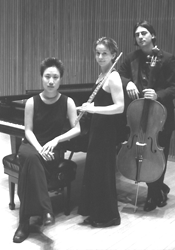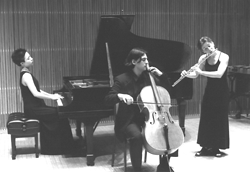

While they may try to shrug it off, senior flutist Claire Chase, pianist Phyllis Chen (OC '99) and senior cellist Kivie Cahn-Lipman of the Elan Trio deserve the spotlight that's about to come their way. In their mission to "perform, promote and innovate programs of new and old music," the Elan have recently commissioned Professor of Composition Pauline Oliveros to write a performance art piece scored the trio and soprano, entitled Elemental Gallop. Soprano Tony Arnold (OC '92) will join Elan for the world premiere at Oberlin in April, and for additional performances in Cleveland and Chicago in the fall.
Tired but buzzed from a weekend of rehearsals, Chase and Cahn-Lipman joined Emily Manzo after their long drive from Chicago where Phyllis is studying with Ursula Oppens. Phyllis was contacted via e-mail.

Emily Manzo (EM): Why are you named the Elan Trio?
Claire Chase (CC): In our signature piece, Vox Balanae, by George Crumb, there are separate climaxes for each of the three instruments and Crumb writes above all of them, "very freely, with elan." We looked it up and found that it meant "spirit, verve, fire." We thought it was good name for a chamber ensemble.
EM: Vox Balanae's a great piece.
Kivie Cahn-Lipman (KC-L): That's how we first got together, actually. Phyllis discovered the piece, and I had been playing in a piano trio with her the previous semester. Claire and I had met in Contemporary Music Ensemble, so when we needed a flutist, I asked her.
CC: After we started working on the Crumb, we realized our mutual interests in a variety of other things, from Bach interpretations, to Mozart's flair and touch, to an affinity for late twentieth century music. We also clicked on general stylistic points that usually take chamber groups a long time to weed out and discuss. I began playing with Kivie and Phyllis thinking that these were people exclusively interested in twentieth century music, and discovered that they were equally passionate about great chamber music from other periods.
EM: So you're working on a program for upcoming performances?
KC-L: Our focus right now is preparation for three competitions coming up in April and May. We're playing the Crumb again, and also a Haydn trio, which is new to us.
CC: It's a delightful piece, and it feels nice to play Haydn and then turn around and do Crumb. After not rehearsing together for eight months, it's really getting us together as an ensemble. Every technical problem or stylistic problem you have is exposed in that music.
EM: You're extremely versatile players and willing to embrace different styles, but is there a style that you feel, as a trio, most comfortable playing in?
CC: Twentieth century music. It's our passion, and that's where the bulk of the repertoire is. Ultimately, we'd like to commission new works and be actively involved in the music of the twenty-first century. But we believe we can't do that without having a strong love for everything that came before it, and the ability to play it well. At least for now.
EM: But even the twentieth century included a variety of styles. Is there a specific one you feel you do best?
CC: "Elan!" Ha Ha.
KC-L: Ha. Um, as far as twentieth century goes, I think we're most comfortable with tonal or if not completely tonal, not completely serial or music.
EM: So how did the Oliveros commission come about?
CC: It's kind of a funny story, actually. We'd been talking for a long time about commissioning a piece from a major American composer. There'd been no real discussion about commissioning something right away, it was just a dream of ours. Then I won the Presser Award and all of a sudden we had money and there were four pieces being written for the ensemble, which meant we'd all be playing together again. Phyllis, in her very spontaneous way called Pauline up and said "Hi! We're the Elan trio! Will you write a piece for us?"
EM: Why did you choose Pauline?

Phyllis Chen (PC): What had inspired the Oliveros commission was my desire to combine theatre and music. I have always thought there are many elements involved in making a live artistic performance, and in the case of most concert music, visual aspects are not directly addressed by the composer in the score. With the kind of unique performance dynamic I felt with Kivie and Claire on stage, I thought it would be worth exploring for us.
My interest in Oliveros came upon hearing her CD entitled Deep Listening. What left a powerful impression on me was her philosophy on how to listen to music, or better yet, how to reach music through meditation and her own concept of 'deep listening.' I find Oliveros' ideas to be very original, and thought she would be interested in exploring this venue of theatre and music, and hopefully make it into a unique and successful experience for herself, the performers and listeners.
CC: The specifications for the commission are just that it will be a theatrical/performance art piece, born out of the tradition of Crumb. It's to be written for our trio and the Chicago-based soprano, Tony Arnold.
KC-L: Around the same time that Phyllis had called Pauline, Claire and I had just seen a concert of Tony Arnold singing a whole program of contemporary and twentieth century repertoire accompanied by Bob Spano.
CC: The performance floored both of us - just completely floored us.
KC-L: It was definitely one of the greatest concerts I've ever seen, anywhere.
CC: Sometimes when you're in a great concert you think, "Wow, I would be the happiest person in the world if I could play with this person."
KC-L: So we emailed Tony and she got back to us almost immediately and said that she'd love to sing in the Oliveros commission.
EM: I hear that you have a manager now.
CC: Hudie [Conservatory Sophomore Walter Houghton] is so helpful. When Phyllis first spoke with Pauline, Pauline asked her to send our publicity materials. Phyllis called me up and said "Claire! Where are our publicity materials?!" I was like, "Well, I'll make some up!" Then Phyllis told me that she wants a demo CD, and I was like, "But we don't have a demo CD!" Then she reminded me, "We have that old DAT recording of the Crumb, isn't it under your bed somewhere?" We're happy to have someone organize things for us, and it gives us more time to rehearse.
The Elan Trio has planned a rigorous rehearsal schedule throughout the spring semester, with Chase and Cahn-Lipman travelling to Chicago every weekend to meet with Chen. The group will perform on the Presser Award Recital to be held at Oberlin in mid-April.
Style made easy: The Elan Trio practices for their upcoming performance at the Presser Award Recital in April. (photos courtesy of Elan Trio)
Copyright © 2000, The Oberlin Review.
Volume 128, Number 13, February 11, 2000
Contact us with your comments and suggestions.